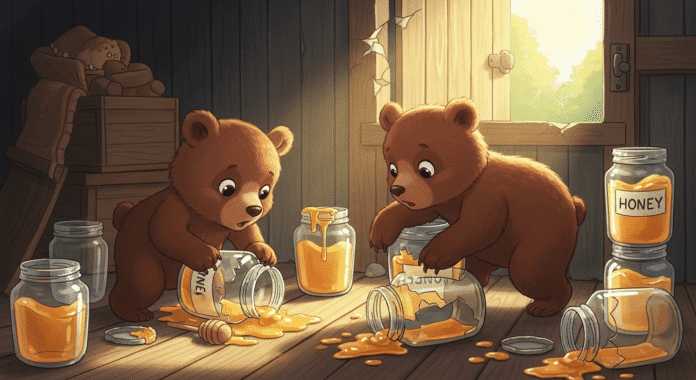The Great Honey Heist: Bears Break Out, Binge on Honey, and Nap in Devon
By David LaGuerre
Two Escaped Bears Turn Into Honey Bandits
It sounds like something straight from a children’s book: two young bears broke out of their enclosure in Devon, UK, tracked down a stash of honey, devoured every last drop, and promptly fell asleep. That’s precisely what happened at the Dartmoor Zoo this month, transforming a potentially dangerous situation into a sugary — and strangely adorable — fiasco.
The cubs, described by caretakers as “energetic and clever,” apparently exploited a weak point in the fencing, slipping out during the early morning hours. Their destination? A storage shed where staff had been keeping honey for enrichment activities. By the time keepers found them, the cubs were sound asleep in what one staffer jokingly called a “sugar coma.”
How Did This Happen?
Dartmoor Zoo has maintained a generally strong track record for animal security, but this case highlights just how inventive wildlife can be. According to the BBC (2025), the fence in question was undergoing scheduled repairs and may have been easier to push open than keepers realized.
A spokesperson explained:
“Bears are incredibly intelligent, especially juveniles. They will test boundaries constantly. If there’s a weakness, they’ll find it.”
This event is not unique. The Brookings Institution has studied the ways in which highly intelligent mammals, from bears to raccoons, adapt to urban environments and human structures. When food is available — especially a treat as irresistible as honey — these animals will go to surprising lengths to get it.
Why Honey Appeals So Much
Bears and honey are a classic pairing for a reason. According to National Geographic (2023), honey provides a rich energy source, perfect for animals preparing to hibernate or simply for fast-growing cubs. In the wild, brown bears will raid beehives if given the chance, sometimes enduring painful stings for the reward.
The Dartmoor cubs found the honey so satisfying they didn’t even bother to roam further. Instead, they gorged themselves and then curled up to nap in the storage shed. It’s both hilarious and a cautionary tale about the powerful drive wildlife has toward high-calorie foods.
Public Safety and Animal Welfare
For some, this might feel like a harmless escapade. But wildlife experts warn that animal escapes can turn tragic if the animals panic or encounter the public. In this case, no one was harmed — partly thanks to the bears being so stuffed they could hardly move — but it could have ended differently.
Zoo professionals around the world are re-evaluating containment protocols in the face of rising climate pressures and more intense storms, which can damage enclosures. As climate change shifts animal behavior and habitat needs, similar “great escapes” may become more frequent. Pew Research (2024) found that UK citizens overwhelmingly support humane animal management but also expect strong safeguards against such incidents.
Counterpoints and Considerations
Some critics argue that animals should never be held in captivity in the first place, suggesting that even modern zoos can fail to meet wildlife needs. While that argument deserves respect, a 2024 report from the Zoological Society of London concluded that properly run zoos still play a vital role in conservation, breeding endangered species, and educating the public.
Still, the honey heist shows why ongoing investment in enclosure design and enrichment is essential. If bears feel bored or stressed, they’ll look for any way out — and a honeypot can be a powerful motivator.
Sweet Dreams and Lessons Learned
In the end, the “great honey heist” left keepers with some repair bills and two snoozing bears to herd back home. But it also left the public with a smile — and a reminder that we share the world with other highly motivated, highly intelligent species.
One zookeeper summed it up best to The Guardian:
“They were being bears. We have to respect that, even if it means replacing a few honey jars.”
As climate and habitat pressures continue to build, stories like this will become more common. How we prepare and respond — with empathy, planning, and a touch of humor — will define our relationship with wildlife going forward.
What’s your take on this sweet bear escapade? Share your thoughts in the comments or pass this story along — let’s keep the conversation going.



